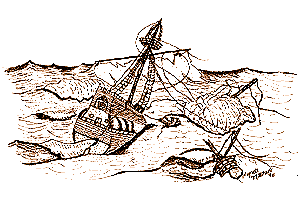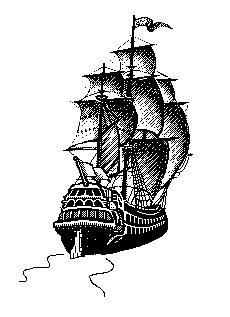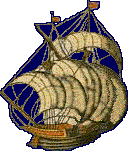

 MERCHANT PRINCES
MERCHANT PRINCES 
Ocean travel in the Greyhawk world is of limited use really because the bulk of major Kingdoms and their economies are land locked. This is maybe the reason that it has been largley ignored ( although a supliment for Forgotten Realms did attempt to cover this ). The sea is a great place to stage adventurers. In the past the ocean has counted as travelling in wilderness and many DMs roll for encounters three times covering day and night. But this cannot be right. Ninty five percent or more of all Ocean going trafic moves along established trade routes which are protected or at least patrolled by the navies of kingdoms for whom this trade is important. Even the thickest random monster will learn to steer clear of these lanes. This of course must not preclude the possibility of attack by some creatures but more often Pirates (AAAAAGH!) and Privateers.
To illustrate the importance of sea trade take for example a trade caravan travelling with goods from Bissel to The Great Kingdom. To carry the same as a ship couuld transport the merchant would need alot of wagons firstly. These require drivers and secondly an armed escort over such a distance. The distance is made even longer by considerations of terrain. Now put the same cargo on a ship, which although it has a sizable crew can travel twice as far in one day, and twice again as far by night. It does not have to head major obsticals either ( except islands whose coasts are not hull friendly ). Do some math, it makes sence. A more likley trade route would be to somewhere closer, about half the distance. The Ship will sell its cargo and pick up a return cargo. The cargo it has sold will be for less gold that it would get in the great kingdom but it makes twice as many runs each way. The cargo may be bought by merchants who will transport it to the Great Kingdom for more profit.

Sounds like a nice little earner eh? Well it should be because running a ship requires money. The only consideration many people think of is crew wages. But if a ship and crew are visiting a new port for the first time they may need the services of a harbour pilot who is familier with the tides, currents and underwater banks. This should cost no less than 35gp for such a vital service. Some cities and ports may insist on the use of pilots ( they can board with customs men )in their ports. Once you have docked of course one must pay a fee to use the Pier. We may assume that if the merchant is a tax payer in the city then he need pay no fee, an incentive to base operations inside a city. If however a merchant is visiting a fee of 20 to 40gps per day may be payable.
So how long should a ship stay in port. Well as long as it takes to sell and unload its cargo then but and load a new one. This of course takes time and time is money. So there are cargo agents. A differant type of merchant. An agent buys and sells the cargos that go through a port. He will know someone who is looking for what the merchant is selling and have job lots of cargo ready to be bought. A collective of farmers may sell their goods via an agent guarenteeing them a market for their surplus. What is in it for the agent? Typicaly 2% to 3% of the transaction value. 3% if the agent is used to but or sell, 2% if he is involved in both. Using an agent can cut turn around time for ships by as mush as three days which is a saving in big ports ,maybe 140gp.

A pier is essential for a seaside city. It cuts down the load/unload times for ship as follows. A ship may be unloaded or loaded at a rate of 6 tonnes per hour. This is an average time based on the loadind of cargo nets, hoist operation and possible mishaps or delays. Goods for loading or being unloaded can stay on the pier for two days maximum, where after they are subject to a daily tariff at 5gp per tonne at maximum.
If a merchant ship is visiting a busy city port then pier space may be at a premium. In this case ships will stay at anchor and await a free berth. If however a ship is unlikley to gain a berth within an acceptable time unloading may begin immediatly via row boats (the ships) or flat bottom barges ( hired in port ). By row boat cargo may be unloaded / loaded at a rate of 1.5 tonnes per hour. Using a port barge a larger volume may be moved allowing a rate of 3 tonnes per hour. Both these methods do involve cost. The Pier tariff for cargo space is effective immediatly and paid the same day even if the cargo is being moved directly to a ware house. However the tariff is half for the initial day than the normal fee. A barge will cost 2gp per hour to hire and may have a minimum hire period ( 6 or 12 hours is normal ).
To recap here is a summery of applicable charges and time tables for merchant ships
Agents: 3% transaction value but or sell, 2% if involved both buy and sell.
Berthing costs: 20gps up to 40gps larger ports ( villages are only 1-2gps perday )
Harbour Pilots costs: 35gp
Port Barges costs: 2gp per hour ( min 6 or 12 hour hiring )
Pier Cargo Tariffs: 5gp per ton per day (after two days) 2gp for cargo landing via barge/row boat.

It makes sense for merchants with regular trade routes to have warehouses in diferent cities they visit and do business with. This makes it affordable and possible to buffer goods at port cities. Merchants may even hire their own cargo agents, family mambers are often choosen because money is involved. Here after we enter the realms of the Merchant Princes whose economic power is vast. They will control many wagon trains and ship, have private armies to protect their interests and exert strong political pressure. Their contribution through taxes to any kingdoms upkeep is strong leverage.
The possibilities for adventures here are endless. Ports as you can see a busy exciting places with politics, money, criminals and power adding to the mix. Running an on-going concern may not make the basis for a permanent campaign but if players have an interest that they can eventually leave to make money by itself they have a base of operations and a ready source of adventure.
MAKING WAVES
( The Wumble on the Water )
It is a dreeded cry that bellows from the crows nest of any ship. "Pirates Ahoy!" thats pirates, or "Rich Ponce in a flash boat armed to the teeth!", Privateers. Either way its all going to end in Cutlass weilding capers and tears for somebody. So who are these desperados fo the High seas and whats in it for them?
![]() PIRATES
PIRATES ![]()
The most infamous outlaws anywhere are pirates of course. They attack with numbers and ferocity stealing and killing averything. But to be a success in this career takes a bit of know how. The first thing any pirate needs is a base of operations which is at least secure. Some kingdoms may turn a blind eye to the pressence of Pirates in their ports as long as they do not attack their shipping. The income pirates generate and the amount they spend may balance off against the trouble they generate and help protect the Kings ships or ships under his flag. It may be assumed I think that throughout the Azure sae uncharted fishing villages and other settlements exist on the profit that comes from aiding and arming Pirates.
Any settlement doing this will have cargo agents at hand to pick up cheap goods ( pirates cannot usually expect market price for their goods ). Agents may also pay pirates to transport or escort the goods to neutral or safe territory (cash on delivery of course). Some Agents may in fact have very good working relationships with Pirates and visa versa.
So this is how a pirate will dispose of goods, but what about captured ships. This is more complicated. A ship can cost 40,000gp new, thats alot of money. Second hand it can be sold for 35% to 60% of its new cost. As a gesture of gratitude or reward a pirate Captain may grant a captured vessel to a trusted first mate. But more commonly they are sold to other pirates or traders looking for a bargain. In history pirate fleets have existed, and they have been organised and formidable forces. The Vagabonds were a huge group who laid seige to Mediterranian island city for ten years! Only a combined fleet from many kingdoms would break such a force as no King would risk his entire fleet by itself unless the danger was extreme. Such an under taking by a number of kingdoms may take time to organise and than more time to be effective. Hunting ships in a vast ocean is a matter of good guess work and stratagey. But you can see how one successful pirate could mount a campaign against a kingdom. The goal is profit so all the king has to do is pay protection money ( as the Saxon English paid vast sums to the Vikings ).

The captains make money, but what of their men? When a man signs on as a pirate he signs the ships articles ( an effective contract ). This entitles him to a share of the booty. The captain decides the shares. The captains is normally 50% with the rest divided up with the crew. Officers shares may be paid directly from the Captains share. Ships are not booty in most cases but the property of the Captain. A captain may opt to also divide this small fortune with long serving crew members ( an incentive for long service and loyalty ). Pirate will stay at sea for a long time cruising for plunder. When they have enough they make for home. A new recruit can expect nothing for his first cruise if he joins an established ship. There after he will gain an increasing share, thereby making it in his interests to protect his captain if he runs a fair ship. The money he can expect is divided between more men than normally crew a ship. A pirate ship must carry enough men not only to sail the ship but to fight and sail captured ships. Any rew must be of sufficient numbers to absorb casualties of combat.
Pirates do not and never have made all their money from raiding ship. A crew of sufficient size will allow a large alnd force to embark and attack inland villages and towns. The taking of slaves is also a bonus in this case because young farm hands and damsels fetch a better price than crusty old sailors who stink of Old Spice.
 PRIVATEERS
PRIVATEERS 
Privateers are the swash-bucklers of the Ocean. They are usually rich before they start robbing everybody and have there own ship(s). The rank or job of Privateer is created during wartime by a King. The king will grant letters of Marquis to individual Nobles or Adventurers. This letter is a licence to attack enemy shipping and coastal towns. The privateer acts independently from any army or navy and instead makes his own private war upon the enemy for profit. All the profit is not his though, about 50% will go to the king to fund his war ( or his drink habit ). Only a finite number of letters are awarded so a price may be askd in exchange ( somewhere in the region of 10,000 to 25,000gps ). A letter may be given as a reward to favoured individuals.
Privateers have the omfort of friendly ports and patrolled waters to return to. The articles of enlistment remain the same as for pirates, but not as profitable for the crew members ,although they have the comfort of knowing they are legal ,some may even serve out of patriotism. A Privateer if he is a Noble will have troops with which to man his ship. They should recieve war pay as normal and a small share, leaving a tidy little profit for the sailors. As with priates Privateers may launch land attacks and are in a better position to do so because thay command disiplined ans trained troops skilled in land combat. A suprise attack on an enemy lords castle could be an important victory or make the enemy commit more troops to internal security rather than the battle field. A vessel may drop anchor at dusk and use the cover of night to disembark troops. The Privateer may force march and decend upon an enemy settlement at first light and then be gone before the alarm is raised. Privateers are restricted in so far as they cannot take slaves as this may be frowned upon at home or even illegal.
The possibilities for adventurer are great here and if the PCs are traders this may provide a useful sideline. To act as a privateer is to gain recognition by powerful people if one carries out heroic deeds or makes great sacrafice or gains. One route to nobility for the PC.
